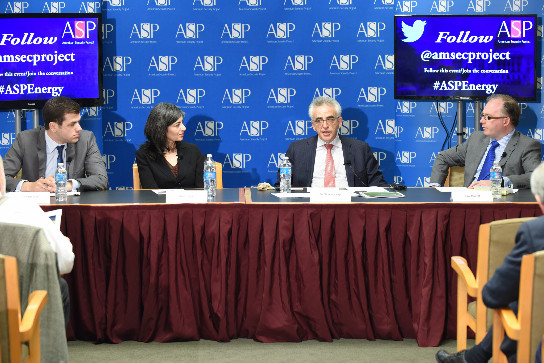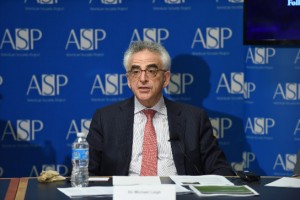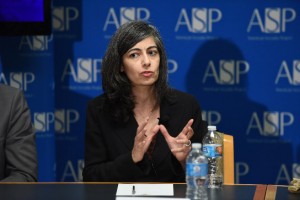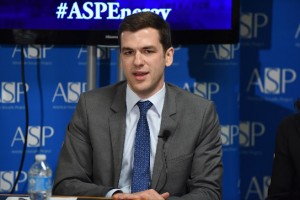
Geopolitics of Energy Security in the Eastern Mediterranean: Panel 2 Recap
Podcast: Play in new window | Download
Subscribe: Apple Podcasts | RSS
In ASP’s Geopolitics of Energy Security in the Eastern Mediterranean event’s second panel, ASP hosted Sir Michael Leigh, a senior fellow of the German Marshall Fund of the United States, Ms. Anne Korin, the Co-Director of the Institute for the Analysis of Global Security, and Mr. Emre Tuncalp, the managing partner of Sidar Global. The panelists discussed the role of energy relationships in the Eastern Mediterranean for building cooperation, as well as what barriers are present to developing these relationships.
Speaking first was Sir Michael Leigh, who set the framework for the discussion on energy issues in the Eastern Mediterranean:
“When Noble Energy began drilling offshore from Cyprus, we heard the first challenging or even threatening words from Turkey on this. This really rang a lot of bells with me, as these were countries that I knew very well from previous involvement, and I saw the risk of these resources, which really ought to be for the benefit of all the peoples in the region, instead becoming a source of conflict and exacerbating longstanding disputes.”
 Sir Michael explained that energy cooperation is never a source of peace, but it does reinforce peace. Leigh emphasized the need for Israel and its neighbors to find cooperation on issues that are nonpolitical in order to create lasting relationships which will foster further cooperation. Speaking from an EU perspective, Leigh explained that there is great potential for the energy in the Eastern Mediterranean to help the EU and other countries move away from their reliance on Russia, and that the EU has strong interest in seeing successful energy development in the Mediterranean.
Sir Michael explained that energy cooperation is never a source of peace, but it does reinforce peace. Leigh emphasized the need for Israel and its neighbors to find cooperation on issues that are nonpolitical in order to create lasting relationships which will foster further cooperation. Speaking from an EU perspective, Leigh explained that there is great potential for the energy in the Eastern Mediterranean to help the EU and other countries move away from their reliance on Russia, and that the EU has strong interest in seeing successful energy development in the Mediterranean.
Next was Ms. Anne Korin, who spoke on the realities of energy company interests in the Eastern Mediterranean:
“Until there’s confidence established that we know what the rules are, and we know that they’re not going to change, and we can safely invest, and know what our return will be—assuming we overcome technical hurdles and other risks—until we know that the government won’t change the rules of the game, none of that potential can be realized.”
 Ms. Korin spoke of the biggest barrier to energy development in Israel, the issue that the Israeli government has attempted to “socialize the reward while privatizing the risks,” speaking of the issue where the companies which are taking on the biggest risks are already having their rewards taken from them, and there is very little incentive for them to enter the market when they have no confidence in a return on their investment.
Ms. Korin spoke of the biggest barrier to energy development in Israel, the issue that the Israeli government has attempted to “socialize the reward while privatizing the risks,” speaking of the issue where the companies which are taking on the biggest risks are already having their rewards taken from them, and there is very little incentive for them to enter the market when they have no confidence in a return on their investment.
Last was Mr. Emre Tuncalp, who spoke on how Turkey plays a role on energy in the Eastern Mediterranean:
“Turkey has a decades long ambition to become a transit country, and an energy hub; taking advantage of its geopolitical position and its strategic location between the supply centers and the demand centers.”
 Mr. Tuncalp stressed Turkey’s desire to see development of energy in the region for its economic prosperity, since it is almost entirely reliant on foreign energy (importing roughly 98% of its consumed energy). Turkey is also well positioned to be a hub for energy, enhancing its role in regional politics. So despite Turkey’s rhetoric that it wants Israel to change its policies before doing business, private investment between Turkey and Israel has been on an upward trend and Turkey has a strong interest in seeing the success of energy cooperation.
Mr. Tuncalp stressed Turkey’s desire to see development of energy in the region for its economic prosperity, since it is almost entirely reliant on foreign energy (importing roughly 98% of its consumed energy). Turkey is also well positioned to be a hub for energy, enhancing its role in regional politics. So despite Turkey’s rhetoric that it wants Israel to change its policies before doing business, private investment between Turkey and Israel has been on an upward trend and Turkey has a strong interest in seeing the success of energy cooperation.





